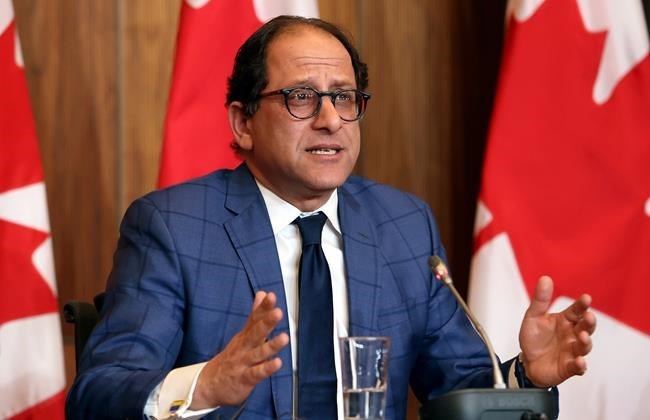OTTAWA — The House of Commons foreign affairs committee wants the Trudeau government to report to Parliament on a regular basis about whether its sanctions regime is actually working.
The MPs agreed on asking Ottawa to advance its work on punishing Russia in international tribunals for its invasion of Ukraine, and to send Russian diplomats packing when they go beyond the normal duties of international relations.
The recommendations stem from a months-long study into how Canada should best respond to Russia's invasion of Ukraine. The report was released Tuesday after what MPs said were months of partisan squabbling over unrelated issues.
"This is a very robust report," said Liberal MP Ali Ehsassi, who chairs the committee.
"These recommendations reflect our collective determination to respond in a serious, steadfast and unified way to the gravest foreign-policy challenge we have faced in decades.
The committee launched a study of the Russian military buildup at the border with Ukraine shortly before Moscow chose to invade the country a year ago.
Since then, Ottawa has sanctioned hundreds of people linked to Russia's war effort, as well as officials accused of human-rights breaches from Haiti to Sri Lanka. Canada has also banned Russian firms from some areas of commerce and imposed fees that make products much more expensive to buy in Canada.
The sanctions are meant to incentivize better behaviour and to bar wealthy Russians and Belarusians under European sanctions from moving their money into Canadian accounts.
But the MPs heard from experts and Ukraine's ambassador that it's unclear whether the sanctions are actually having an impact, and to what extent Russian oligarchs are working around these limitations.
The committee is asking the Liberals to go beyond occasional updates on the total amount of funds that have been frozen and to report regularly on who's had assets frozen, what shell companies are involved and whether those targeted are evading the sanctions.
"My worry is that at this point, the Canadian government is not doing what they can to enforce the sanctions," NDP foreign affairs critic Heather McPherson said.
"They don't work if they are not enforced; if we do not have a good enforcement mechanism, and our allies recognize that."
The committee also calls on Canada to "expel Russian diplomats involved in any activities that are not consistent with their official diplomatic status."
The Ukrainian Canadian Congress has said Canada should expel all Russian diplomats on the grounds that Moscow is committing genocide, but Global Affairs Canada has stressed that Russia would likely close Canada's embassy and hamper Ottawa's ability to gather information and assist in consular cases.
Others noted that European countries have scaled down relations with Russia without severing ties.
Conservative MP Garnett Genuis noted that there are no known cases of Canada expelling diplomats for interfering in domestic politics, and it's unclear whether Canada's sanctions are working.
"One of the problems we've seen with this government is a gap on implementation," he said.
Russia's embassy in Ottawa immediately dismissed the report, saying it amounts to MPs spouting off without meriting deeper analysis.
"It’s a classic piece of propagandistic distortion of reality, false claims and accusations with added attempt to interfere into Russia’s domestic affairs," the embassy wrote in an email.
The MPs have sought a commitment that Ottawa will not authorize the export of any pipeline turbines to Russia for the duration of its war in Ukraine.
Last year, the Liberals approved a request from Germany to help with the maintenance of a Russian gas pipeline by allowing turbines under repair in Montreal to be sent to Europe, against the wishes of Ukraine. Ultimately, Ottawa removed that exemption when Russia cut off natural gas supplies.
The committee wrapped up its hearings last October, taking four months to issue Tuesday's report. That's due in part to arguments between the parties and filibusters on a handful of unrelated issues, which played out both in public and behind closed doors.
Bloc Québécois foreign affairs critic Stéphane Bergeron admitted in French to "a certain feeling of embarrassment," despite MPs finding consensus on numerous fronts.
"It would absolutely have been possible to table this report more quickly, and consequently to have the government benefit from our recommendations, our observations, much faster," he said in French.
"But the committee was, so to speak, held hostage by considerations of a partisan nature which paralyzed its work for several weeks."
Bergeron said that delayed the committee's upcoming trip to Europe to examine how allies have responded to Russia's invasion of Ukraine.
Ehsassi said his committee members will head to Sweden, Finland, Belgium and Poland. "We really want to make sure that we all benefit from this trip and we come back with fresh ideas," he said.
The Tories agreed with all recommendations in Tuesday's report but added their own suggestions in an annex, such as expanding Canadian energy exports to help allies meet their needs. The Bloc Québécois instead advocated for a global transition to renewable energy.
The committee has asked the government to table a response to the report and plans to study Canada's sanctions regime in the coming months.
This report by The Canadian Press was first published Feb. 14, 2023.
Dylan Robertson, The Canadian Press



